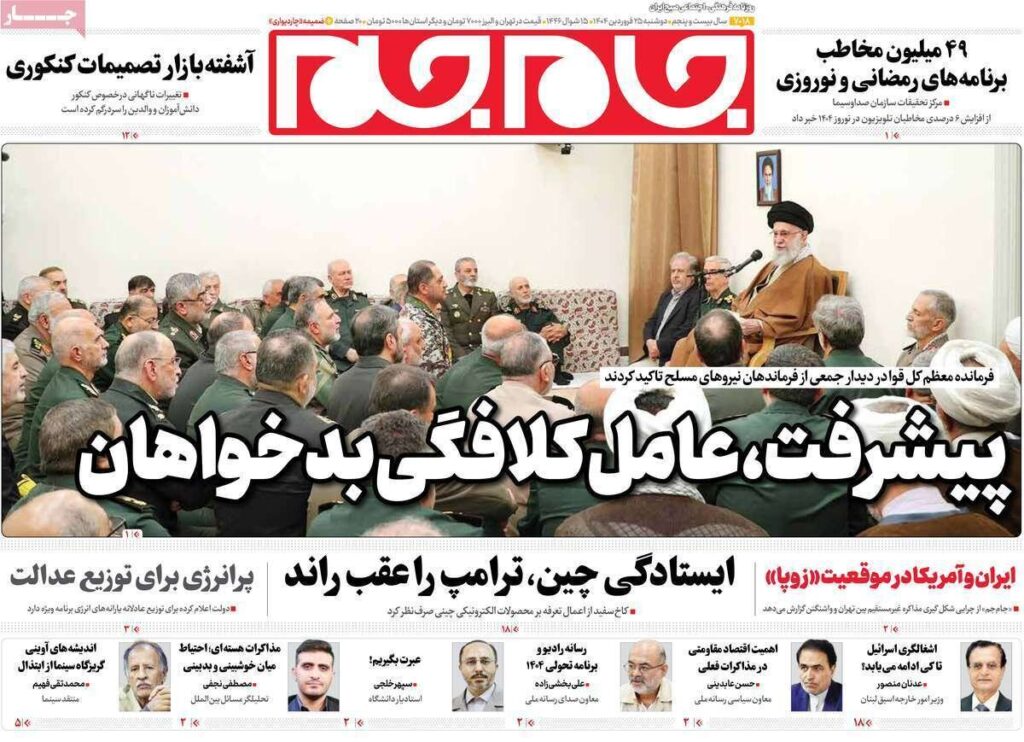Tehran – In a memo, Jam-e-Jam discussed nuclear negotiations for Muscat.
It writes: Recently, Muscat, the capital of Oman, has once again become a center of global diplomacy. The Islamic Republic of Iran and the United States have begun indirect negotiations in the city. These negotiations were not only diplomatic procedures, but also a global psychological warfare centered around the Western media. While negotiations focused specifically on nuclear issues and lifting sanctions, some Western media outlets, particularly Reuters, have attempted to unrealistically distort the nature of consultations in this regard, creating false narratives. Despite the media atmosphere that attempts to mislead the purpose of the negotiations and spread the imaginary narrative of Iran’s retreat, the reality is that negotiations focused solely on nuclear issues and lifting sanctions. The negotiations demonstrate Iran’s responsible and constructive approach in the international sector, particularly considering the Islamic Republic’s resolve to secure national interests through diplomacy.
Farhikhtegan: Pakistan awaits good news from the Muscat conversation
In his analysis, Fahhictegan discussed Pakistan’s enthusiasm for the Iran-US agreement and stated: The inability to realize the ideal conditions for comprehensive cooperation between the Islamic Republic of Iran and Pakistan depends heavily on bilateral relations between the two countries and the United States. For nearly 20 years, the project has been caught up in the ups and downs of Pakistan’s decision and relations between Washington and Tehran, and has actually reached a dead end. Given Pakistan’s economic situation and the need for energy resources, many Pakistani politicians have sought to complete the national project, but US sanctions on Iran have made these efforts useless. With this in mind, it appears that Pakistanis are currently looking for Muscat. So perhaps an agreement between Washington and Tehran allows them to regulate economic ties with Tehran and create new terms for them Energy-hungry Economy.
Etemad: In the case of an agreement, the US must provide the necessary guarantees
Etemad spoke with political activist Nasser Imani about the first round of nuclear negotiations with the US in Oman on April 11th. He states: People suggest that they believe that the economic and livelihood issues will all be resolved and prices will be reduced shortly after negotiations. These negotiations may only solve some of Iran’s economic problems. It should be noted that most of the cruel sanctions imposed on Iran are related to the US Senate and Congress, and have nothing to do with the US government. If Trump wants to cancel or cut these sanctions, he will need Congressional approval. Even if Iran and the United States agree to issues of interest, this agreement can only reduce some of the sanctions, not all. Furthermore, there are no guarantees regarding the implementation of US commitments. Just as the JCPOA witnessed such an incident in the previous round when it was signed. Therefore, the required warranty must be obtained from the United States. Therefore, we must be aware of the outcomes of these negotiations. We should not please people or disappoint them with the outcome of the negotiations.
Javan: Israel’s rage over nuclear negotiations
From the indirect negotiations between Iran and the US, Zionists and their media affiliates have released numerous reports claiming “Iran’s weakness in negotiations.” The Zionists were unhappy with negotiations between Tehran and Washington representatives, and either silenced or used member media to attack indirect consultations between the parties. After the end of the first round of negotiations, Americans and countries around the world, not only the Iranian side, but also Americans and countries around the world spoke about the positive atmosphere of the negotiations, by constructively evaluating that next week was announced as the date for the next round. However, Zionist media outlets have actually tried to downplay indirect negotiations. According to former CIA executive Graham Fuller, these talks surprised Netanyahu and angered him. What Netanyahu wants is to control the region. But he will not achieve that as long as Iran exists. Iranians do not allow anyone to force them, and the conflict with Iran is disastrous for the region.

